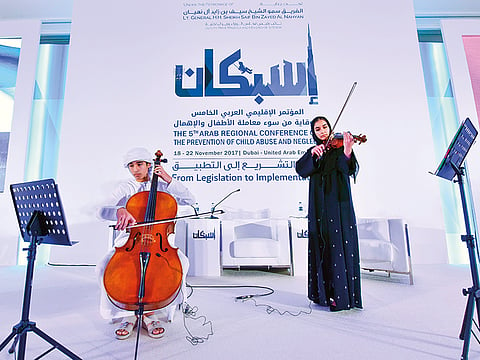‘No Hit Zone’ campaign soon for Dubai children
To educate parents and childcarers that children can be disciplined without spanking or hitting

Dubai: A Dubai foundation will soon launch a ‘No Hit Zone’ awareness campaign to educate parents and childcarers that children can be disciplined without spanking or hitting as corporal punishment is the first trigger to child abuse, experts said on Monday.
Representatives from Unicef, WHO and regional experts in the field of prevention of child abuse and neglect and childcare professionals gathered in Dubai on Monday for the 5th Arab Regional Conference on the Prevention of Child Abuse and Neglect conference.
The three-day conference will discuss the latest scientific development and best practices to prevent abuse against children, with this year’s theme being “From legislation to implementation”.
The opening day coincided with the Universal Children’s Day, an annual celebration on November 20. It is also on the same day in 1989 when the UN General Assembly adopted the Convention of the Rights of the Child.
The conference is organised by the International Society for Prevention of Child Abuse and Neglect (ISPCAN) and the Arab Society for Prevention of Child Abuse and Neglect, in partnership with the Dubai Foundation for Women and Children (DFWAC). Afra Al Basti, DFWAC Director-General, said the foundation will implement the different strategies highlighted in the conference such as INSPIRE, a seven-step strategy to end violence against children, and the ‘No Hit Zone’ over the next years.
The issue is not where violence starts. It can start anywhere. ... You’ll never know where the violence is because violence is a behaviour more than anything else.”
The ‘No Hit Zone’ is a campaign that promotes healthy relationships and safe environments where no adult shall hit an adult or a child or vice versa, and where no child shall hit a child.
“We are going to be part of this campaign. Saudi Arabia will start [in 2018] and we will have the same programme to be implemented here,” Al Basti told Gulf News.
Al Basti stressed the importance of eliminating violence against children in all environments, not just at home.
“The issue is not where violence starts. It can start anywhere. Sometimes, you protect your children but once they go to school, they experience violence in school, sometimes vice versa. You’ll never know where the violence is because violence is a behaviour more than anything else,” she added.
Al Basti said the UAE can follow the steps that Sweden took in banning corporal punishment as a means to discipline children.
We know from studies, statistics, and even from studying the brain and hormonal level of the child, that corporal punishment does not change the behaviour.”
Dr Maha Al Muneef, Executive Director of the National Family Safety Programme and keynote speaker at the conference, said child abuse can be successfully prevented if social norms are changed.
“Violence against children and child maltreatment really start with corporal punishment. Corporal punishment is the first trigger, it increases and escalates to become really violent. We really want to tackle the problem from where it starts,” Dr Al Muneef said.
Dr Al Muneef said the Arab region must all adopt the ‘No Hit Zones’ campaign because violence has significant and lasting negative effects on children that can persist into adulthood. Violence does not only affect a child’s behaviour but can literally scar the child from the inside for life.
“Many a time, even in the Arab region, people think that corporal punishment works and we argue with parents that corporal punishment does not work. We know from studies, statistics, and even from studying the brain and hormonal level of the child, that corporal punishment does not change the behaviour,” Dr Al Muneef said.
Child abuse has a toxic impact on the brain, Dr Al Muneef added. In a comparative study, the brain scans of an abused child showed significant inactivity in certain parts compared to the brain scan of a child who did not experience any violence. Even the child’s telomeres, the stretches of DNA which protect the genetic data, are shorter in abused children, she said.



